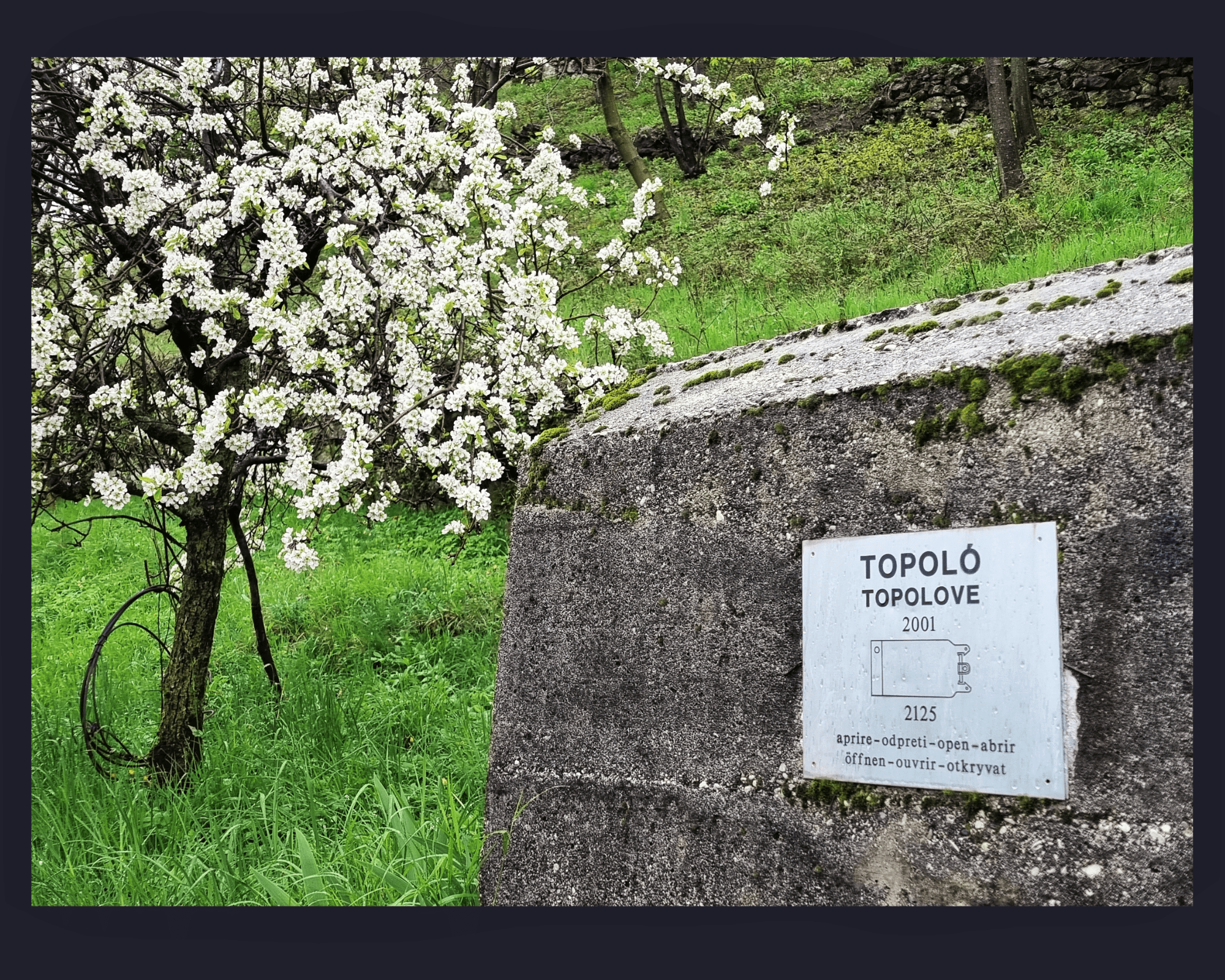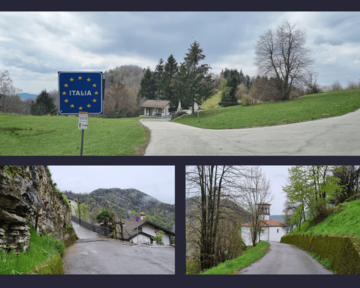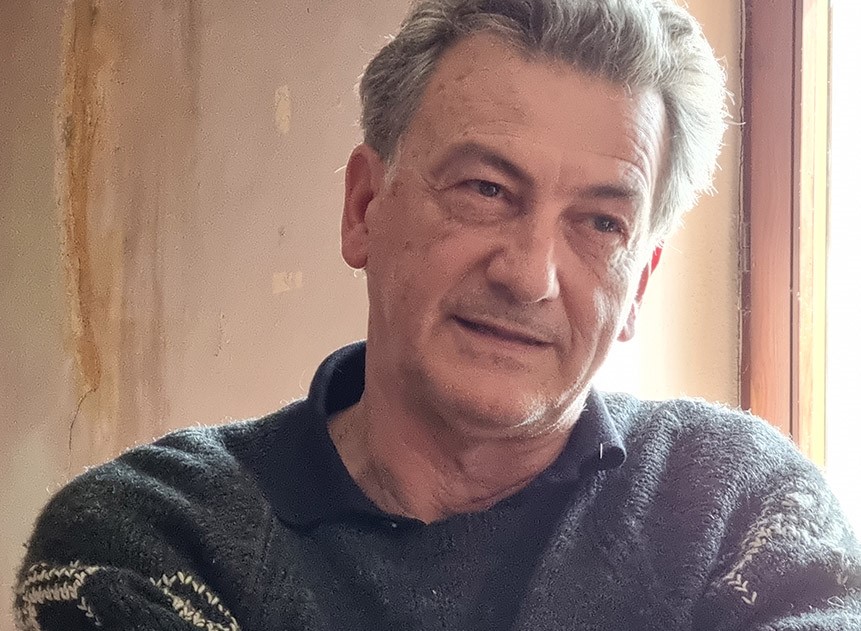Topolò, Europe. Voices from the border/1
Bilingualism denied, espionage in families, Gladio: history on the border has left indelible marks on the present of Topolò, a town on the Italian-Slovenian border where, also thanks to European funds, attempts are being made to build a future. First part of a reportage

Topolo-Europa.-Voci-dal-confine-1
Spring in Topolò, photo by Antonio Senter
Topolò, a cluster of houses perched on a slope embraced by the mountains in the province of Udine, a few hundred metres from the border with Slovenia, is generally spoken of by making a list of what is not there: "No school, no shop, no bar, no post office, no clinic, no tobacconist, no pharmacy, and even the Internet connection isn’t always there”. Indeed, grasping its essence is a much more complex and delicate operation, which perhaps has little to do with what is there and what is missing, but more with what was and what could be.
For centuries a hub of cultures and exchanges, a hinge between the Italian-speaking and German-speaking worlds, after the First World War Topolò dramatically suffered the storms of politics, first with fascism, then with the cold war, and literally bled out. "Depopulation was not just a natural phenomenon dictated by the economic situation – we were told several times during our stay – here it was a matter of a conscious strategy of zeroing out the population, to remove the Slovenian minority, which was the majority here".
History, combined with the particular geographical design of Topolò, located where the road that climbs from Cividale ends, still resonates powerfully in the present of its twenty inhabitants. "Here we read the 20th century", says Moreno Miorelli, who arrived in the village thirty years ago with his project of site-specific art installations. Donatella Ruttar, co-director of Stazione Topolò-Postaja Topolove for several years, confirms: “Even though the Iron Curtain officially no longer existed, even during the first years of the Station, in the mid-1990s, tensions returned in waves, and anyone who dealt with the border or with the Slovenian minority was regarded with suspicion and probably also monitored by the authorities”.
Throughout the 20th century, the people of Topolò had a deeply conflicting and painful relationship with the authorities: colonised in their own homes and suppressed in their own language by the ruthless policy of forced Italianisation of fascism – a fate analogous to the German speakers of the province of Bolzano – and then since 1946 manipulated and guarded by the democratic central authorities and by the secret services in an anti-Yugoslav function, unlike the South Tyroleans who instead saw their linguistic minority rights gradually recognised, the Slovenian-speaking Italians of the Natisone valleys represent a cruel defeat of postwar history. “Europe? – Moreno Miorelli told us – here there wasn’t even the Italian Constitution!”.
Only in 2001 would the linguistic minority get official recognition, but it will certainly take a few more decades to unmake that fabric of fragility and suspicion, of shame and distrust, for the wrongs to be, if not equalised, at least less acute, and to achieve full citizenship.
"Even though Slovenian is spoken everywhere here – says architect Donatella Ruttar, who grew up in Clodig, a couple of kilometres from Topolò – my own parents forbade us to speak it, and my father demanded from my brother to be called papà, in Italian". In the 1960s, in the middle of the Cold War, Slovenian language lovers were accused of being Tito’s supporters, suspected of having links with the enemy across the border, watched over by members of the secret Gladio organisation.
Moreno shows us card no. 2443, issued on August 1, 1946 to the patriot with the battle name Piedmont: "The third voluntary corps of freedom would later become Gladio, and we know what other matters these patriots then dealt with". For Miorelli, history was the strongest call to settle in the Natisone Valleys in the early 1990s: passionate, meticulous, creative in seeking and finding connections, poet, friend, and collaborator of Andrea Pazienza, the founder of Stazione Topolò insistently highlights how much the history that has crossed this area of Italy is intricate, complex, and painful.
From the windows here you can see the profile of Kolovrat, the trench that the Italians had to cede to the Austrians in October 1917 during the famous defeat of Caporetto. Now over there, in Kobarid (the Slovenian Caporetto), is where the Friulians go on Sundays to eat, to visit the gorges of the Isonzo, and to get petrol, but the idea of the border has remained there, tangible, concrete, above all because of that what would happen in the following decades.
“Until the Great War, here, the linguistic border did not coincide with the political-military one”, explains Donatella, creator and curator of the SMO (Slovensko multimedialno okno/ Slovenian multimedia window) of San Pietro al Natisone, a storytelling museum dedicated to the cultural landscape from the Giulie Alps to the sea, from Mangart to the gulf of Trieste. Until the beginning of the 20th century, although the border between the Kingdom of Italy and the Austro-Hungarian Empire ran just a few steps away, the people of these valleys had much closer relationships with the villages "on the other side" than with the valley floor "on this side", in Benecia or Friulian Slavia. "They took care of the pastures, collected wood, went hunting, using a territory that often crossed borders", explains Donatella, who recounts how these permanent borders also affected religious life, with de facto cross-border parishes, and with cemeteries in the Empire intended, for example, also for citizens of the Kingdom.
The real defeat here began with fascism and the suppression of the language, of that Slovenian dialect which was the mother tongue for most of the inhabitants of the Natisone valleys; and it also continued with the arrival of the democratic republic, after World War II, with the strategy of emptying. "Here you needed a permit from the Ministry of Defense even just to cut down a tree", says Moreno Miorelli. "And life was difficult even for those priests who cultivated the local culture, but who were hated by power, by NATO, and were under special surveillance".
Hence the loss of population, which went from 400 inhabitants to twenty times less. And with the inhabitants, the activities went away, the last bar was closed forty years ago. A similar fate was suffered in the 20th century by the whole area that occupies the slopes of Kolovrat and Monte San Martino in a fan shape: men went to the mines of Belgium, women to domestic work throughout Europe.
“And yet Topolò has always welcomed initiatives that go against the tide, such as the arrival of three hundred sheep from Macedonia in the mid-1970s”, recalls Donatella. In 1975, the one that would later become her husband, architect Renzo Rucli, in the new left-wing municipal administration (the only example in the whole valley, in a strongly Christian Democrat context, with inclinations towards right-wing parties) collaborated in the design of a pilot project for the maintenance of the territory, the creation of jobs, the development of new businesses. A forerunner of cross-border European projects, the "sheep project" included training courses for shearing, wool processing, weaving, and even if it then went bankrupt over the years, everyone here remembers it with pride. "For us it was the sign that in Topolò the community was alive, despite everything", smiles Donatella.
And indeed later the Station would arrive, with artists from all over the world, but also the restructuring of half the country thanks to European funds for the widespread hotel, and the recovery of the landscape and paths as part of other European projects. But that’s another story.
Il reportage da Topolò include anche:
This content is published in the context of the “Work4Future” project co-financed by the European Union (EU). The EU is in no way responsible for the information or views expressed within the framework of the project. The responsibility for the contents lies solely with OBC Transeuropa. Go to the “Work4Future“
Tag: Work for Future
Featured articles
- Take part in the survey
Topolò, Europe. Voices from the border/1
Bilingualism denied, espionage in families, Gladio: history on the border has left indelible marks on the present of Topolò, a town on the Italian-Slovenian border where, also thanks to European funds, attempts are being made to build a future. First part of a reportage

Topolo-Europa.-Voci-dal-confine-1
Spring in Topolò, photo by Antonio Senter
Topolò, a cluster of houses perched on a slope embraced by the mountains in the province of Udine, a few hundred metres from the border with Slovenia, is generally spoken of by making a list of what is not there: "No school, no shop, no bar, no post office, no clinic, no tobacconist, no pharmacy, and even the Internet connection isn’t always there”. Indeed, grasping its essence is a much more complex and delicate operation, which perhaps has little to do with what is there and what is missing, but more with what was and what could be.
For centuries a hub of cultures and exchanges, a hinge between the Italian-speaking and German-speaking worlds, after the First World War Topolò dramatically suffered the storms of politics, first with fascism, then with the cold war, and literally bled out. "Depopulation was not just a natural phenomenon dictated by the economic situation – we were told several times during our stay – here it was a matter of a conscious strategy of zeroing out the population, to remove the Slovenian minority, which was the majority here".
History, combined with the particular geographical design of Topolò, located where the road that climbs from Cividale ends, still resonates powerfully in the present of its twenty inhabitants. "Here we read the 20th century", says Moreno Miorelli, who arrived in the village thirty years ago with his project of site-specific art installations. Donatella Ruttar, co-director of Stazione Topolò-Postaja Topolove for several years, confirms: “Even though the Iron Curtain officially no longer existed, even during the first years of the Station, in the mid-1990s, tensions returned in waves, and anyone who dealt with the border or with the Slovenian minority was regarded with suspicion and probably also monitored by the authorities”.
Throughout the 20th century, the people of Topolò had a deeply conflicting and painful relationship with the authorities: colonised in their own homes and suppressed in their own language by the ruthless policy of forced Italianisation of fascism – a fate analogous to the German speakers of the province of Bolzano – and then since 1946 manipulated and guarded by the democratic central authorities and by the secret services in an anti-Yugoslav function, unlike the South Tyroleans who instead saw their linguistic minority rights gradually recognised, the Slovenian-speaking Italians of the Natisone valleys represent a cruel defeat of postwar history. “Europe? – Moreno Miorelli told us – here there wasn’t even the Italian Constitution!”.
Only in 2001 would the linguistic minority get official recognition, but it will certainly take a few more decades to unmake that fabric of fragility and suspicion, of shame and distrust, for the wrongs to be, if not equalised, at least less acute, and to achieve full citizenship.
"Even though Slovenian is spoken everywhere here – says architect Donatella Ruttar, who grew up in Clodig, a couple of kilometres from Topolò – my own parents forbade us to speak it, and my father demanded from my brother to be called papà, in Italian". In the 1960s, in the middle of the Cold War, Slovenian language lovers were accused of being Tito’s supporters, suspected of having links with the enemy across the border, watched over by members of the secret Gladio organisation.
Moreno shows us card no. 2443, issued on August 1, 1946 to the patriot with the battle name Piedmont: "The third voluntary corps of freedom would later become Gladio, and we know what other matters these patriots then dealt with". For Miorelli, history was the strongest call to settle in the Natisone Valleys in the early 1990s: passionate, meticulous, creative in seeking and finding connections, poet, friend, and collaborator of Andrea Pazienza, the founder of Stazione Topolò insistently highlights how much the history that has crossed this area of Italy is intricate, complex, and painful.
From the windows here you can see the profile of Kolovrat, the trench that the Italians had to cede to the Austrians in October 1917 during the famous defeat of Caporetto. Now over there, in Kobarid (the Slovenian Caporetto), is where the Friulians go on Sundays to eat, to visit the gorges of the Isonzo, and to get petrol, but the idea of the border has remained there, tangible, concrete, above all because of that what would happen in the following decades.
“Until the Great War, here, the linguistic border did not coincide with the political-military one”, explains Donatella, creator and curator of the SMO (Slovensko multimedialno okno/ Slovenian multimedia window) of San Pietro al Natisone, a storytelling museum dedicated to the cultural landscape from the Giulie Alps to the sea, from Mangart to the gulf of Trieste. Until the beginning of the 20th century, although the border between the Kingdom of Italy and the Austro-Hungarian Empire ran just a few steps away, the people of these valleys had much closer relationships with the villages "on the other side" than with the valley floor "on this side", in Benecia or Friulian Slavia. "They took care of the pastures, collected wood, went hunting, using a territory that often crossed borders", explains Donatella, who recounts how these permanent borders also affected religious life, with de facto cross-border parishes, and with cemeteries in the Empire intended, for example, also for citizens of the Kingdom.
The real defeat here began with fascism and the suppression of the language, of that Slovenian dialect which was the mother tongue for most of the inhabitants of the Natisone valleys; and it also continued with the arrival of the democratic republic, after World War II, with the strategy of emptying. "Here you needed a permit from the Ministry of Defense even just to cut down a tree", says Moreno Miorelli. "And life was difficult even for those priests who cultivated the local culture, but who were hated by power, by NATO, and were under special surveillance".
Hence the loss of population, which went from 400 inhabitants to twenty times less. And with the inhabitants, the activities went away, the last bar was closed forty years ago. A similar fate was suffered in the 20th century by the whole area that occupies the slopes of Kolovrat and Monte San Martino in a fan shape: men went to the mines of Belgium, women to domestic work throughout Europe.
“And yet Topolò has always welcomed initiatives that go against the tide, such as the arrival of three hundred sheep from Macedonia in the mid-1970s”, recalls Donatella. In 1975, the one that would later become her husband, architect Renzo Rucli, in the new left-wing municipal administration (the only example in the whole valley, in a strongly Christian Democrat context, with inclinations towards right-wing parties) collaborated in the design of a pilot project for the maintenance of the territory, the creation of jobs, the development of new businesses. A forerunner of cross-border European projects, the "sheep project" included training courses for shearing, wool processing, weaving, and even if it then went bankrupt over the years, everyone here remembers it with pride. "For us it was the sign that in Topolò the community was alive, despite everything", smiles Donatella.
And indeed later the Station would arrive, with artists from all over the world, but also the restructuring of half the country thanks to European funds for the widespread hotel, and the recovery of the landscape and paths as part of other European projects. But that’s another story.
Il reportage da Topolò include anche:
This content is published in the context of the “Work4Future” project co-financed by the European Union (EU). The EU is in no way responsible for the information or views expressed within the framework of the project. The responsibility for the contents lies solely with OBC Transeuropa. Go to the “Work4Future“
Tag: Work for Future












